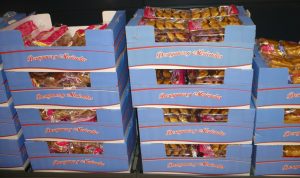This year the rainy season in Tokyo and surrounding areas was extremely short and it seemed as if it went straight from spring to summer. Global warming has caused summer to last longer than before and it has become more and more serious. I wonder how the corrugated industry can contribute to tackling the problem of global warming.
This time I visited a major bread maker in Madrid, Spain, one of the environmentally advanced countries in Western Europe. In European countries they usually eat freshly baked bread for breakfast. However, in Madrid it is common to enjoy Spanish madeleines or other sweet breads at breakfast.
Consumers have a custom of buying a great deal with their big bags at one time in the bakery or supermarket. Regular plastic crates, which are common in Japan, are used for transporting from factories to selling areas. The following cycle foments an increase in carbon dioxide after the crates are delivered: collect→transfer→clean→dry.
Because of this environmental issue, corrugated crates are getting more and more popular these days. They are environmentally friendly due to their light-weight and are easily disposable. Recyclable crates do not fall into the cycle that emits greenhouse gases. I tried to lift those blue colored corrugated crates (See photo) and was very surprised at how light they were.
Because these corrugated crates are lighter than the traditional plastic ones the fuel consumption of trucks would be less, resulting in a more efficient delivery. They can be displayed as is at the shop as long as the space is available.
Currently, corrugated crates for meat, sausage, seafood, and sandals have been introduced. Standard corrugated shipping boxes are regular slotted type boxes. I recommend that you consider adding corrugated crates to your product lineup. They can be made by a rotary die-cutter.

The environmentally friendly corrugated crates for food





